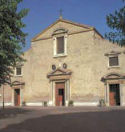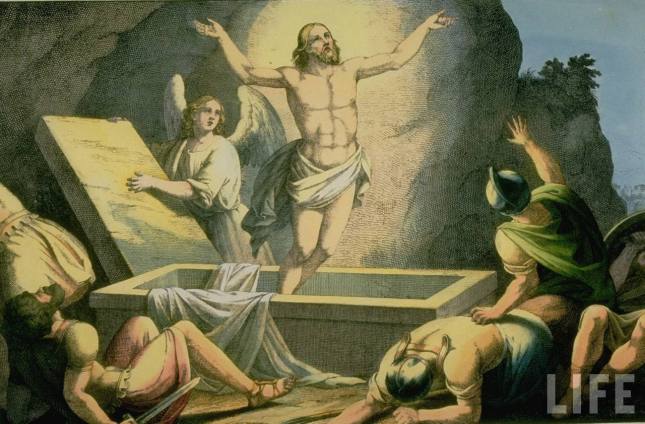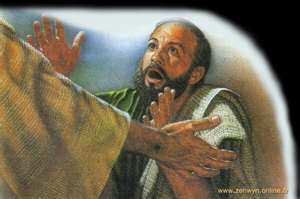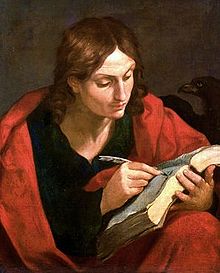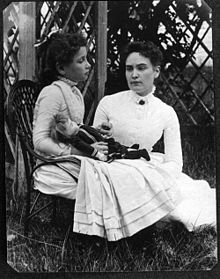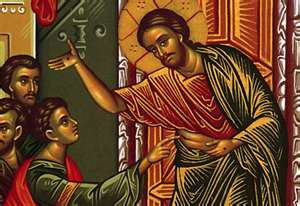19. Then the same day at evening, being the first day of the week, when the doors were shut where the disciples were assembled for feel of the Jews, came Jesus and stood in the midst, and says to them, Peace be to you.
20. And when he had so said, he showed to them his hands and his side. Then were the disciples glad, when they saw the Lord.
21. Then said Jesus to them again, Peace be to you: as my Father has sent me, even so send I you.
22. And when he had said this, he breathed on them, and says to them, Receive you the Holy Ghost:
23. Whosesoever sins you remit, they are remitted to them; and whose soever sins you retain, they are retained.
24. But Thomas, one of the twelve, called Didymus, was not with them when Jesus came.
25. The other disciples therefore said to him, We have seen the Lord. But he said to them, Except I shall see in his hands the print of the nails, and put my finger into the print of the nails, and thrust my hand into his side, I will not believe.
CHRYS. The disciples, when they heard what Mary told them, were obliged either to disbelieve, or, if they believed, to grieve that He did not count them worthy to have the sight of Him. He did not let them however pass a whole day in such reflections, but in the midst of their longing trembling desires to see Him, presented Himself to them: Then the same day at evening, being the first day of the week, when the doors were shut where the disciples were assembled for fear of the Jews.
BEDE. Wherein is strewn the infirmity of the Apostles. They assembled with doors shut, through that same fear of the Jews, which had before scattered them: Came Jesus, and stood in the midst. He came in the evening, because they would be the most afraid at that time.
THEOPHYL. Or because He waited till all were assembled: and with shut doors, that he might show how that in the very same way he had risen again, i.e. with the stone lying on the sepulcher.
AUG. Some are strongly indisposed to believe this miracle, and argue thus: If the same body rose again, which hung upon the Cross, how could that body enter through shut doors? But if you comprehend the mode, it is no miracle: when reason fails, then is faith edified.
AUG. The shut door did not hinder the body, wherein Divinity resided. He could enter without open doors, who was as born without a violation of His mother's virginity
CHRYS. It is wonderful that they did not think him a phantom. But Mary had provided against this, by the faith she had wrought in them. And He Himself too showed Himself so openly, and strengthened their wavering minds by His voice: And says to them, Peace be to you, i.e. Be not disturbed. Wherein too He reminds them; of what He had said before His crucifixion; My peace 1 give to you; and again, In Me you shall have peace.
GREG. And because their faith wavered even with the material body before them, He showed them His hands and side: And when He had said this, He showed them His hands and His side.
AUG. The nails had pierced His hands, the lance had pierced His side. For the healing of doubting hearts, the marks of the wounds were still preserved.
CHRYS. And what He had promised before the crucifixion, I shall see you again, and you, heart shall rejoice, is now fulfilled: Then were the disciples glad when they say the Lord.
AUG. The glory, wherewith the righteous shall shine like the sun in the kingdom of their Father, i.e. in Christ's body, we must believe to have been rather veiled than not to have been there at all. He accommodated His presence to man's weak sight, and presented Himself in such form, as that His disciple could look at and recognize Him.
CHRYS. All these things brought them to a most confident faith. As they were in endless war with the Jews, He says again, Then said Jesus to them again, Peace be to you.
BEDE. A repetition is a confirmation: whether He repeats it because the grace of love is twofold, or because He it is who made of twain one.
CHRYS. At the same time He shows the efficacy of the cross, by which He undoes all evil things, and gives all good things; which is peace. To the women above there was announced joy; for that sex was in sorrow, and had received the curse, In sorrow shall you bring forth. All hindrances then being removed, and every thing made straight, he adds, As My Father has sent Me, even so send I you
GREG. The Father sent the Son, appointed Him to the work of redemption. He says therefore, As My Father has sent Me, even so send I you; i.e. I love you, now that I send you to persecution, with the same love wherewith My Father loved Me, when He sent Me to My sufferings.
AUG. We have learnt that the Son is A equal to the Father: here He shows Himself Mediator; He Me, and I you.
CHRYS. Having then given them confidence by His own miracles, and appealing to Him who sent Him, He uses a prayer to the Father, but of His own authority gives them power: And when He had said this, He breathed on them, and says to them, Receive you the Holy Ghost.
AUG. That corporeal breath was not the substance of the Holy Ghost, but to show, by meet symbol, that the Holy Ghost proceeded not only from the Father, but the Son. For who would be so mad as to say, that it was one Spirit which He gave by breathing, and another which He sent after His ascension?
GREG. But why is He first given too the disciples on earth, and afterwards sent from heaven? Because there are two commandments of love, to love God, and to love our neighbor. The spirit to love our neighbor is given on earth, the spirit to love God is given from heaven. As then love is one, and there are two commandments; so the Spirit is one, and there are two gifts of the Spirit. And the first is given by our Lord while yet upon earth, the second from heaven, because by the love of our neighbor we learn how to arrive at the love of God.
CHRYS. Some say that by breathing He did not give them the Spirit, but made them meet to receive the Spirit. For if Daniel's senses were so overpowered by the sight of the Angel, how would they have been overwhelmed in receiving that unutterable gift, if He had not first prepared them for it! It would not be wrong however to say that they received then the gift of a certain spiritual power, not to raise the dead and do miracles, but to remit sins: Whosoever sins you remit, they are remitted to them, and whosoever sins you retain, they are retained.
AUG. The love of the Church, which is shed abroad in our hearts by the Holy Spirit, remits the sins of those who partake of it; but retains the sins of those who do not. Where then He has said, Receive you the Holy Ghost, He instantly makes mention of the remission and retaining of sins.
GREG. We must understand that those who first received the Holy Ghost, for innocence of life in themselves, and preaching to a few others, received it openly after the resurrection, that they might profit not a few only, but many. The disciples who were called to such works of humility, to what a height of glory are they led! Lo, not only have they salvation for themselves, but are admitted to the powers of the supreme Judgment-seat; so that, in the place of God, they retain some men's sins, and remit others. Their place in the Church, the Bishops now hold; who receive the authority to bind, when they are admitted to the ram; of government. Great the honor, but heavy the burden of the place. It is ill if one who knows not how to govern his own life, shall be judge of another's.
CHRYS. A priest though he may have ordered well his own life, yet, if he have not exercised proper vigilance over others, is sent to hell with the evil doers. Wherefore, knowing the greatness of their danger, pay them all respect, even though they be not men of notable goodness. For they who are in rule, should not be judged by those who are under them. And their incorrectness of life will not at all invalidate what they do by commission from God. For not only cannot a priest, but not even angel or archangel, do any thing of themselves; the Father, Son, and Holy Ghost do all. The priest only furnishes the tongue, and the hand. For it were not just that the salvation of those who come to the Sacraments in faith, should be endangered by another's wickedness.
At the assembly of the disciples all were present but Thomas, who probably had not returned from the dispersion: But Thomas, one of the twelve, called Didymus, was not with them when Jesus came.
ALCUIN. Didymus, double or doubtful, because he doubted in believing: Thomas, depth, because with most sure faith he penetrated into the depth of our Lord's divinity.
GREG. It was not an accident that that particular disciple was not present. The Divine mercy ordained that a doubting disciple should, by feeling in his Master the wounds of the flesh heal in us the wounds of unbelief. The unbelief of Thomas is more profitable to our faith, than the belief of the other disciples; for, the touch by which he is brought to believe, confirming our minds in belief, beyond all question.
BEDE. But why does this Evangelist say that Thomas was absent, when Luke writes that two disciples on their return from Emmaus found the eleven assembled? We must understand that Thomas had gone out, and that in the interval of his absence, Jesus came and stood in the midst.
CHRYS. As to believe directly, and any how, is the mark of too easy a mind, so is too much inquiring of a gross one: and this is Thomas's fault. For when the Apostle said, We have seen the Lord, he did not believe, not because he discredited them, but from an idea of the impossibility of the thing itself: The other disciples therefore said to him, We have seen the Lord. But he said to them, Except I shall see in His hands the print of the nails, and put my finger into the print of the nails, and thrust my hand into His side, I will not believe. Being the grossest of all, he required the evidence of the grossest sense, viz. the touch, and would not even believe his eyes: for he does not say only, Except I shall see, but adds, and put my finger into the print of the nails, and thrust my hand into His side.
26. And after eight days again his disciples were within, and Thomas with them: then came Jesus, the doors being shut, and stood in the midst, and said, Peace be to you.
27. Then says he to Thomas, Reach hither your finger, and behold my hands; and reach hither your hand, and thrust it into my side: and be not faithless, but believing.
28. And Thomas answered and said to him, My Lord and My God.
29. Jesus says to him, Thomas, because you have seen me, you have believed: blessed are they that have not seen, and yet have believed.
30. And many other signs truly did Jesus in the presence of his disciples, which are not written in this book:
31. But these are written, that you might believe that Jesus is the Christ, the Son of God; and that believing you might have life through his name.
CHRYS. Consider the mercy of the Lord, how for the sake; of one soul, He exhibits His wounds. And yet the disciples deserved credit, and He had Himself foretold the event. Notwithstanding, because one person, Thomas, would examine Him, Christ allowed him. But He did not appear to him immediately, but waited till the eighth day, in order that the admonition being given in the presence of the disciples, might kindle in him greater desire, and strengthen his faith for the future. And after eight days again His disciples were within, and Thomas with them: then came Jesus, the doors being shut, and stood in the midst, and said, Peace be to you.
AUG. You ask; If He entered by the shut door, where is the nature of His body? And I reply; If He walked on the sea, where is the weight of His body? The Lord did that as the Lord; and did He, after His resurrection, cease to be the Lord?
CHRYS Jesus then comes Himself, and does not wait till Thomas interrogates Him. But to show that He heard what Thomas said to the disciples, He uses the same words. And first He rebukes him; Then says He to Thomas, Reach hither your finger, and behold My hands; and reach hither your hand, and thrust it into My side: secondly, He admonishes him; And be not faithless, but believing. Note how that before they receive the Holy Ghost faith wavers, but afterward is firm. We may wonder how an incorruptible body could retain the marks of the nails. But it was done in condescension; in order that they might be sure that it was the very person Who was crucified.
AUG. He might, had He pleased, have wiped all spot and trace of wound from His glorified body; but He had reasons for retaining them. He showed them to Thomas, who would not believe except he saw and touched, and He will show them to His enemies, not to say, as He did to Thomas, Because you have seen, you have believed, but to convict them: Behold the Man whom you crucified, see the wounds which you inflicted, recognize the side which you pierced, that it was by you, and for you, that it was opened, and yet you cannot enter there.
AUG. We are, as I know not how, afflicted with such love for the blessed martyrs, that we would wish in that kingdom to see on their bodies the marks of those wounds which they have borne for Christ's sake. And perhaps we shall see them; for they will not have deformity, but dignity, and, though on the body, shine forth not with bodily, but with spiritual beauty. Nor yet, if any of the limbs of martyrs have been cut off, shall they therefore appear without them in the resurrection of the dead; for it is said, There shall not an hair of your head perish. But if it be fit that in that new world, the traces of glorious wounds should still be preserved on the immortal flesh, in the places where the limbs were cut off there, though those same limbs withal be not lost but restored, shall the wounds appear. For though all the blemishes of the body shall then be no more, yet the evidences of virtue are not to be called blemishes.
GREG. Our Lord gave that flesh to be touched which He had introduced through shut doors: wherein two wonderful, and, according to human reason, contradictory things appear, viz. that after the resurrection He had a body incorruptible, and yet palpable. For that which is palpable must be corruptible, and that which is incorruptible must be impalpable. But He showed Himself incorruptible and yet palpable, to prove that His body after His resurrection was the same in nature as before, but different in glory.
GREG. Our body also in that resurrection to glory will be subtle by means of the action of the Spirit, but palpable by its true nature, not, as Eutychius says, impalpable, and subtler than the winds and the air.
AUG. Thomas saw and touched the man, and confessed the. God whom he neither saw nor touched. By means of the one he believed the other undoubtingly: Thomas answered and said to Him, My Lord and My God.
THEOPHYL. He who had been before unbelieving, after touching the body showed himself the best divine; for he asserted the twofold nature and one Person of Christ; by saying, My Lord, the human nature by saying, My God, the divine, and by joining them both, confessed that one and the same Person was Lord and God.
Jesus says to him, Because you have seen Me, you have believed.
AUG. He says not, has touched me, but, has seen me; the sight being a kind of general sense, and put in the place often of the other four senses; as when we say, Hear, and see how well it sounds; smell, and see how sweet it smells; taste, and see how well it tastes, touch, and see how warm it is. Wherefore also our Lord says, Reach hither your finger, and behold My hands. What is this but, Touch and see? And yet he had not eyes in his finger. He refers them both to seeing and to touching, when He says, Because you have seen, you have believed. Although it might be said, that the disciple did not dare to touch, what was offered to be touched.
GREG. But when the Apostle says, Faith is the substance of things hoped for, the evidence of things not seen, it is plain that things which are seen, are objects not of faith, but of knowledge. Why then is it said to Thomas who saw and touched, Because you have seen Me, you have believed? Because he saw one thing, believed another; saw the man, confessed the God. But what follows is very gladdening; Blessed are they that have not seen, and yet have believed. In which sentence we are specially included, who have not seen Him with the eye, but retain Him in the mind, provided we only develop our faith in good works. For he only really believes, who practices what he believes.
AUG. He uses the past tense, in the future to His knowledge having already taken place by His own predestination.
CHRYS. If any one then says, Would that I had lived in those times, and seen Christ doing miracles! let him reflect, Blessed are they that have not seen, and yet have believed.
THEOPHYL. Here He means the disciples who had believed without seeing the print of the nails, and His side.
CHRYS. John having related less than the other Evangelists, adds, And many other signs truly did Jesus in the presence of His disciples, which are not written in this book. Yet neither did the others relate all, but only what was sufficient for the purpose of convincing men. He probably here refers to the miracles which our Lord did after His resurrection, and therefore says, In the presence of His disciples, and they being the only persons with whom He conversed after His resurrection.
Then to let you understand, that the miracles were not done for the sake of the disciples only, He adds, But these are written, that you might believe that Jesus is the Christ, the Son of God; addressing Himself to mankind generally. And, this belief, he then profits ourselves, not Him in Whom we believe. And that believing you might have life through His name, i.e. through Jesus, which is life.
Catena Aurea John 20


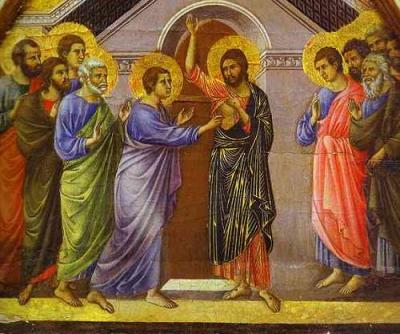




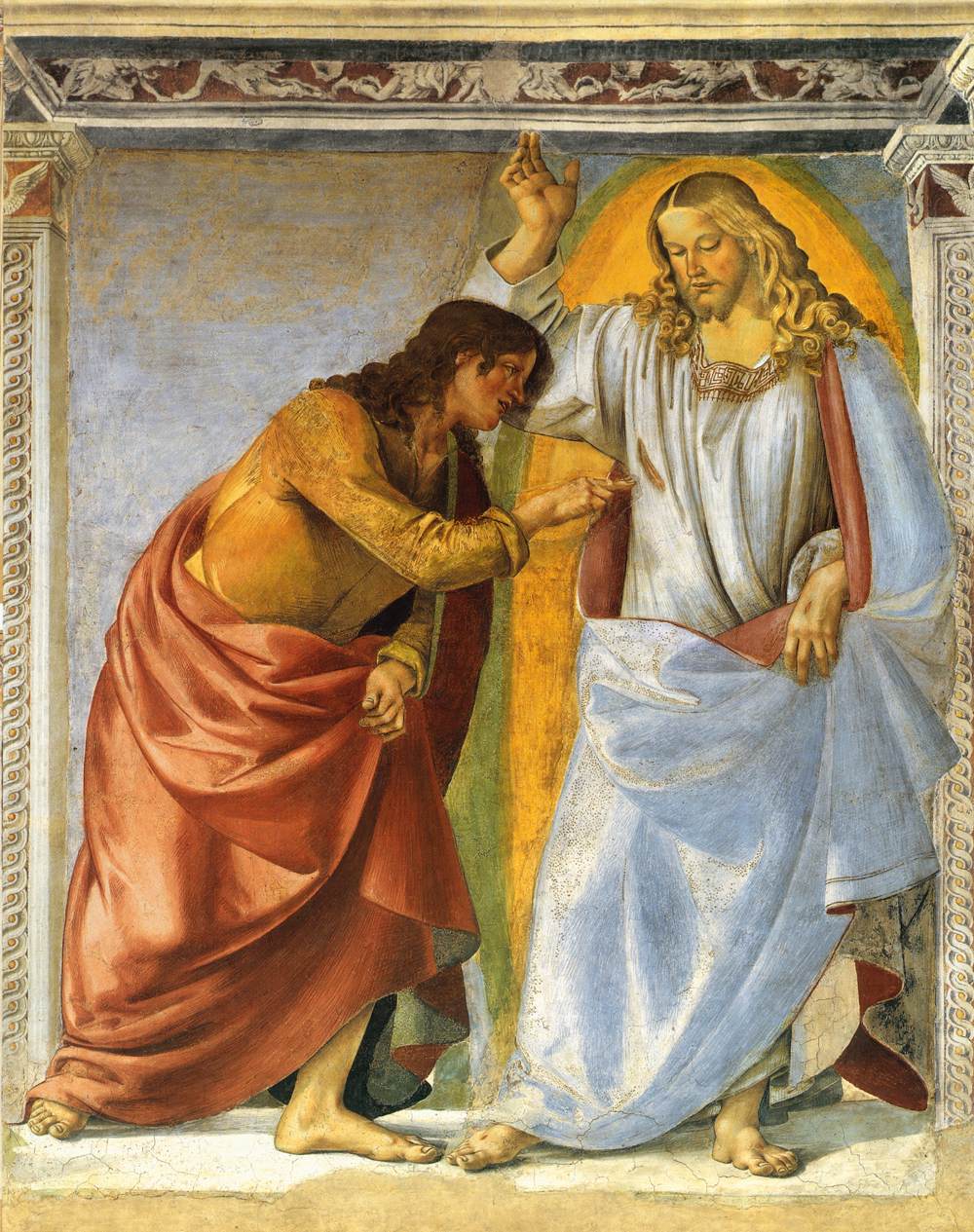

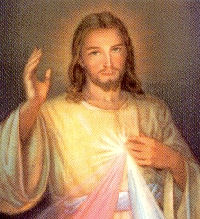
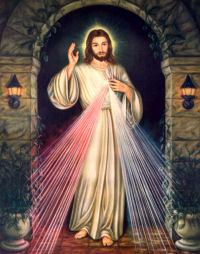 On one occasion, I heard these words: "My daughter, tell the whole world about My inconceivable mercy. I desire that the Feast of Mercy be a refuge and shelter for all souls, and especially for poor sinners. On that day the very depths of My tender mercy are open. I pour out a whole ocean of graces upon those souls who approach the fount of My mercy. The soul that will go to Confession and receive Holy Communion shall obtain complete forgiveness of sins and punishment. On that day all the divine floodgates through which graces flow are opened. Let no soul fear to draw near to Me, even though its sins be as scarlet. My mercy is so great that no mind, be it of man or of angel, will be able to fathom it throughout all eternity. Everything that exists has come forth from the very depths of My most tender mercy. Every soul in its relation to Me will contemplate My love and mercy throughout eternity. The Feast of Mercy emerged from My very depths of tenderness. It is My desire that it be solemnly celebrated on the first Sunday after Easter. Mankind will not have peace until it turns to the Fount of My Mercy.
On one occasion, I heard these words: "My daughter, tell the whole world about My inconceivable mercy. I desire that the Feast of Mercy be a refuge and shelter for all souls, and especially for poor sinners. On that day the very depths of My tender mercy are open. I pour out a whole ocean of graces upon those souls who approach the fount of My mercy. The soul that will go to Confession and receive Holy Communion shall obtain complete forgiveness of sins and punishment. On that day all the divine floodgates through which graces flow are opened. Let no soul fear to draw near to Me, even though its sins be as scarlet. My mercy is so great that no mind, be it of man or of angel, will be able to fathom it throughout all eternity. Everything that exists has come forth from the very depths of My most tender mercy. Every soul in its relation to Me will contemplate My love and mercy throughout eternity. The Feast of Mercy emerged from My very depths of tenderness. It is My desire that it be solemnly celebrated on the first Sunday after Easter. Mankind will not have peace until it turns to the Fount of My Mercy. 